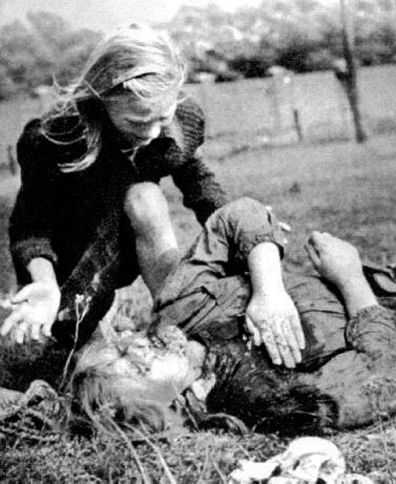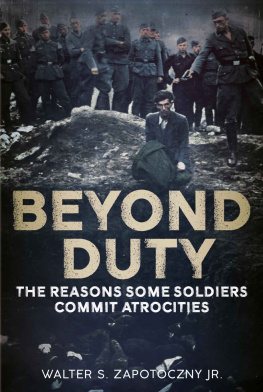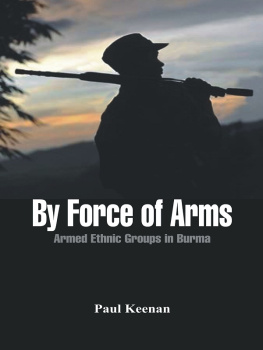

To my wife, Bonnie, whose faith in me never waivers
Fonthill Media Language Policy
Fonthill Media publishes in the international English language market. One language edition is published worldwide. As there are minor differences in spelling and presentation, especially with regard to American English and British English, a policy is necessary to define which form of English to use. The Fonthill Policy is to use the form of English native to the author. Walter S. Zapotoczny Jr. was born and educated in the United States; therefore American English has been adopted in this publication.
Fonthill Media Limited
Fonthill Media LLC
www.fonthillmedia.com
First published in the United Kingdom and the United States of America 2017
British Library Cataloguing in Publication Data:
A catalogue record for this book is available from the British Library
Copyright Walter S. Zapotoczny Jr. 2017
ISBN 978-1-62545-112-5
The right of Walter S. Zapotoczny Jr. to be identified as the author of this work has been asserted by him in accordance with the Copyright, Designs and Patents Act 1988.
All rights reserved. No part of this publication may be reproduced, stored in a retrieval system or transmitted in any form or by any means, electronic, mechanical, photocopying, recording or otherwise, without prior permission in writing from Fonthill Media Limited
Typeset in 10.5pt on 13pt MinionPro
Printed and bound in England
Preface
The history of warfare is filled with accounts of brutality. The behavior of any human being is, of course, a very complex phenomenon whether in war or in peace. It is the collective behavior of the five groups described in this book that are most disturbing. The Japanese Armys actions in Nanking, China, in 1937 was an unplanned outbreak of inconceivable violence and brutality, while the German Einsatzgruppens actions in Russia during World War II, by contrast, were in response to an intentional policy of mass murder. The Russian leadership turned a blind eye to the Red Armys rape and murder of German civilians at the close of World War II, and during the Vietnam War, frightened American soldiers massacred women and children in a small village. American guards practiced masochism and abuses of prisoners at a prison in Iraq. While these are different situations in many ways, there are similar factors that allowed most of the soldiers in these groups to abuse or kill men, women, and children in cold blood.
Historians, in large part, have described in great detail the actions of these groups, but they have not adequately dealt with the factors that contributed to those actions. As we examine these factors, we can perhaps predict the actions of future groups given similar circumstances.
The idea for this book sprang from my graduate thesis, which examined the actions of the Japanese Army and the actions of the German Einsatzgruppen during World War II. After graduate school, I continued to study these and additional military groups and collect a considerable amount of research material, including court transcripts, witness testimony, official government documents, interviews, and primary and secondary works. This book contains summaries of the research material that has been collected over the years. Beyond Duty begins with the examination of the collective behavior of the five military groups representing different combat actions: the Japanese in Nanking, China, in 1937; the German Einsatzgruppen in Russia between 1941 and 1943; Russian Army in Germany in 1945; the Americans at My Lai Massacre in 1968, during the Vietnam War; and the abuse of prisoners by Americans at the Abu Ghraib prison in Iraq in 2004.
After a close analysis of these soldiers, I have identified five principle factors that had the greatest influence, either directly or indirectly, on the many members. Together, the factors supported each other and crystallized into a modus operandi that resulted in atrocities and bestial acts on civilians. The soldiers who committed atrocities became violent criminals. They progressed through the stages of violentization outlined by criminologist Lonnie H. Athens. The purpose of this book is to illustrate how the factors described herein enabled some soldiers to progress through Athens stages to become perpetrators of evil. The reader cannot help but think that the atrocities of these groups were inevitable, given the combination of the factors identified.
CONTENTS

Japanese army recruits at a bayonet drill, practicing on Chinese prisoners. (Look Magazine)

Chinese women raped by Japanese soldiers. (U.S. Army Signal Corps)

Japanese soldier prepares to cut off the head of a Chinese soldier. (David McCormack)

Japanese soldiers bayoneting Chinese soldiers. (David McCormack)

The execution of Polish hostages in retaliation for an attack on a Nazi police station by the underground organization. (U.S. Holocaust Memorial Museum Photo Archives)

Einsatzgruppen soldiers execute Jews on the Eastern Front. (Bundesarchiv)

Execution of Jews from Kiev near Ivangorod in 1942. (Historiek.net)

Einsatzgruppen soldier executes a prisoner in Ukraine. (The Jewish Chronicle)

Captured prisoners on the Eastern Front. (U.S. National Archives and Records Administration)

Questioning Jewish leaders. (U.S. National Archives and Records Administration)

German women collecting potatoes. (Keystone/Getty images)

Next page






















